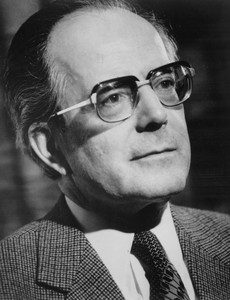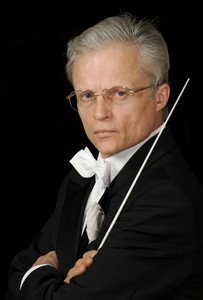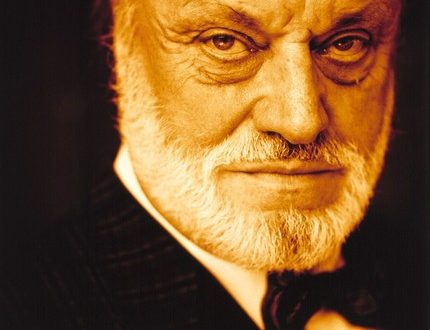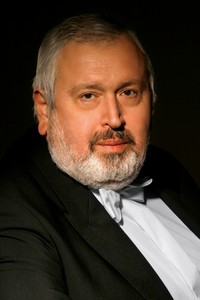
Wolfgang Sawallisch |
Wolfgang Sawallisch

In 1956, Wolfgang Sawallisch for the first time stood at the podium of the Vienna Symphony, one of the best orchestras in Europe, to conduct a concerto from the Grand Symphony series. A “love at first sight” arose between the conductor and the orchestra, which soon led him to the position of chief conductor of this ensemble. Musicians were attracted to Zawallish by his impeccable knowledge of the scores and the unusually clear presentation of his own desires and requirements. They appreciated his method of working at the rehearsal, intense, but very businesslike, devoid of any frills, mannerisms. “What is characteristic of Zawallish,” noted the orchestra’s board, “is that he is… free from individual idiosyncrasies.” Indeed, the artist himself defines his credo in this way: “I would like my own person to be completely invisible, so that I could only imagine the composer’s music and try to make it sound like he listened to it himself, so that any music, whether it be Mozart , Beethoven, Wagner, Strauss or Tchaikovsky – sounded with absolute fidelity. Of course, we generally see the naturalness of those eras with our eyes and hear it with our ears. I doubt that we can perceive and feel as it once was. We will always proceed from our time and, for example, perceive and interpret romantic music based on our current feelings. Whether this feeling corresponds to the views of Schubert or Schumann, we do not know.
Maturity, experience and pedagogical skill came to Zawallish in just twelve years – a dizzying career for a conductor, but at the same time devoid of any sensationalism. Wolfgang Sawallisch was born in Munich and from childhood he showed musical talent. Already at the age of six, he spent hours at the piano and wanted to become a pianist first. But having visited the opera house for the first time at the play “Hansel and Gretel” by Humperdinck, he first felt the desire to lead the orchestra.
A nineteen-year-old graduate of the Zavallish school goes to the front. His studies were resumed only in 1946. Returning to Munich, he became a student of Josef Haas in theory and Hans Knappertsbusch in conducting. The young musician strives to make up for lost time and leaves his studies a year later to take a place as a conductor in Augsburg. You have to start with R. Benatsky’s operetta “The Enchanted Girls”, but soon he was lucky enough to conduct an opera – all the same “Hansel and Gretel”; youthful dream come true.
Zawallisch worked in Augsburg for seven years and learned a lot. During this time, he also performed as a pianist and even managed to win first prize at the competition of sonata duets in Geneva, together with the violinist G. Seitz. Then he went to work in Aachen, already a “music director”, and conducted a lot both in opera and in concerts here, and later in Wiesbaden. Then, already in the sixties, along with the Vienna Symphonies, he also headed the Cologne Opera.
Zawallish travels relatively little, preferring a permanent job. This, however, does not mean that he is limited only to it: the conductor constantly performs at major festivals in Lucerne, Edinburgh, Bayreuth and other European musical centers.
Zawallish has no favorite composers, styles, genres. “I find,” he says, “that one cannot conduct an opera without having a sufficiently complete understanding of the symphony, and vice versa, in order to experience the musical-dramatic impulses of a symphony concert, an opera is necessary. I give the main place in my concerts to the classics and romance, both in the broadest sense of the word. Then comes the recognized modern music up to its classics already crystallized today – like Hindemith, Stravinsky, Bartok and Honegger. I confess that so far I have been little attracted to extreme – twelve-tone music. All these traditional pieces of classical, romantic and contemporary music I conduct by heart. This should not be considered “virtuosity” or an extraordinary memory: I am of the opinion that one must grow so close to the interpreted work in order to perfectly know its melodic fabric, structure, rhythms. By conducting by heart, you reach a deeper and more direct contact with the orchestra. The orchestra immediately feels the barriers being lifted.”
L. Grigoriev, J. Platek, 1969





